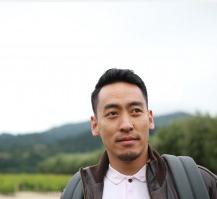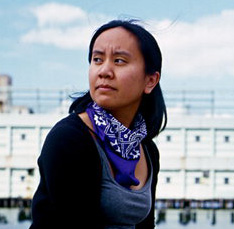The 2014 PBS Online Film Festival is showcasing multiple independent shorts films now through the end of July. The selection includes the award-winning documentary Why We Rise, which gives an in-depth voice to the lives of three undocumented students living in New York City. The film is presented by CAAM. Directed by Corinne Manabat and Brian Redondo, Why We Rise won the Loni Ding Award for Social Issues Documentary during CAAMFest 2014.
The film emerged organically, branching from student organizing in New York City with groups such as RAISE (Revolutionizing Asian American Immigrant Stories on the East Coast), Asian American Legal Defense and Education Fund, and Undocumented, Unafraid fighting for DACA – Deferred Action for Childhood Arrivals. As Manabat and Redondo follow the three students through New York, the film gives an intimate and human perspective on the struggle for civil rights and liberties. The undocumented youth share their stories, the responsibilities, and their hopes and dreams. All three of the film’s participants now have DACA and are in school, still making their way day by day. I had a chance to talk with the filmmakers. Go here to watch the film now.
– Hardeep Jandu
How did you initially get involved with this story? What inspired you to frame the film the way that you did?

BR: So, the origins of the piece has to do with where I used to work. When I first came out of college, I was not doing any filmmaking, and was working as a policy advocate over at the Asian American Legal Defense and Education Fund here in New York. And my coworker, whose still there, had started working with undocumented immigrant youth, helping them fill out their paperwork so that they could apply for Deferred Action for Childhood Arrivals (DACA)—which basically means that if they register with the government, they’re not going to get deported. So, I thought that was a really interesting story. First it was going to be more about deferred action, but listening to their stories, I realized that there was still this baseline story of, “Hey, we’re here. We have a story to tell.” And it’s universal, they go through the same struggles as everybody else, but have this other shadow over them, that has ramifications everywhere they go.
I think the framing came really had a lot do with the activism that they were doing. You know, we kind of filmed them at their meetings, talking to all these students, and learning about what kind of advocacy they wanted to pursue. We went with them to a couple of rallies that they were making along with the larger undocumented student movement. They’re really powerful, if you think about it. They’re outwardly asserting that they are undocumented, and challenging the government and everybody else to do something about it. I think the piece naturally parallels the same framework. And they were willing to share an important part of themselves to you in a way in a way that they wouldn’t have outside of the space. But they were all in the process of coming out. And I don’t think they would have done that had they not had the chance to be with each other through all that organizing.

CM: Brian was going the initial stuff since he worked at AALDEF, and he was like, “Hey Corinne! Can you help me with this project?” And myself being a community organizer, I was like, “Why would I say no?” The young people when I met them, I feel like they always wanted to talk to you about their story and what they were doing, since they were in the thick of their activism.
We were thinking—on a global, bigger picture scale, what makes a young person want to be an activist? Because it relates to them in a certain way? Why do they do the things that they do? Why is it more personalized? They could have easily been like, “I don’t want to tell you anything.” But I think that, coming from the same page, all of us coming from immigrant families, we knew somebody who is going through this.
Thank you. Have you kept in touch with your subjects? How are they doing now?
CM: Yeah! Actually one of them is in law school. So, we haven’t seen her in a long time because she’s trying to do her thing, you know.And another one is deep in college, and another one is also in college. So, they’ve just been super busy and keeping it moving. But what I see on Facebook, and what I see from them too, is that they’re still active. Still continuing on, going to conferences, going to different things and still speaking out about their situation and immigration reform.
BR: And fortunately, they were all able to get Deferred Action. Able to get DACA. So all of them are in much better circumstances right now.
Were there any challenges you faced as you made the film? Or any special highlights and memories?
BR: I think getting the subjects to be comfortable to share their stories honestly, particularly for this, because it’s legally sensitive information. You know we documentary filmmakers you want to have complete access to everything in a film, and we’d like to have included it, more on their families and about their whole lives. But that just wasn’t a possibility, it would actually really endanger a lot of people if we did that.
CM: But I think as a side note too, not only a challenge but a beautiful thing, my favorite part was spending one day with them. So, for the most part when we interviewed them we spent a whole day with them. And I think that was really great. I think that would be such a great memory, just the process, all those times that we hung with them for the day, because it was literally almost the whole day that we hung out with them. We interviewed them for about an hour or two, but other than that we were just talking to them and hanging out with them.
BR: One interesting challenge with Ru, the girl that lives in Chinatown, is that she works full-time, also goes to school, works 12-hour shifts at a restaurant. So if we asked her to spend a day with us, that means that she doesn’t work that day and doesn’t get paid that day. At the same time, it was so powerful that you would want to share a story that was so true, just to show what people are experiencing. To really hit the nail in the head. We were so fortunate that she was able to do it.
CM: On top of that too, Ru was taking care of her sister also. It was like, “Who’s going to babysit and watch my sister?” She was super sweet, I remember, she was always like—”Do you want to eat?” Or, “Oh, let me show you my church!” She was showing us around like she’s never been to New York or something. “Let me show you where I buy fruit!” It was so cute.
Is there anything else that you want to add?
CM: I think I wanted to add that, on behalf of Brian and I, we’re so appreciative of being able to receive the Loni Ding Award. First and foremost, just to go to CAAMFest, having the film screened there. Because we’d shown it in New York and locally in the East Coast, and to have it go elsewhere is really great for what we’re trying to say with the film, bringing about a path to citizenship for those who are undocumented. Thank you again.
This interview has been edited for length and clarity.
Main image: Nerial, one of the subjects in Why We Rise, attends CAAMFest 2014.




